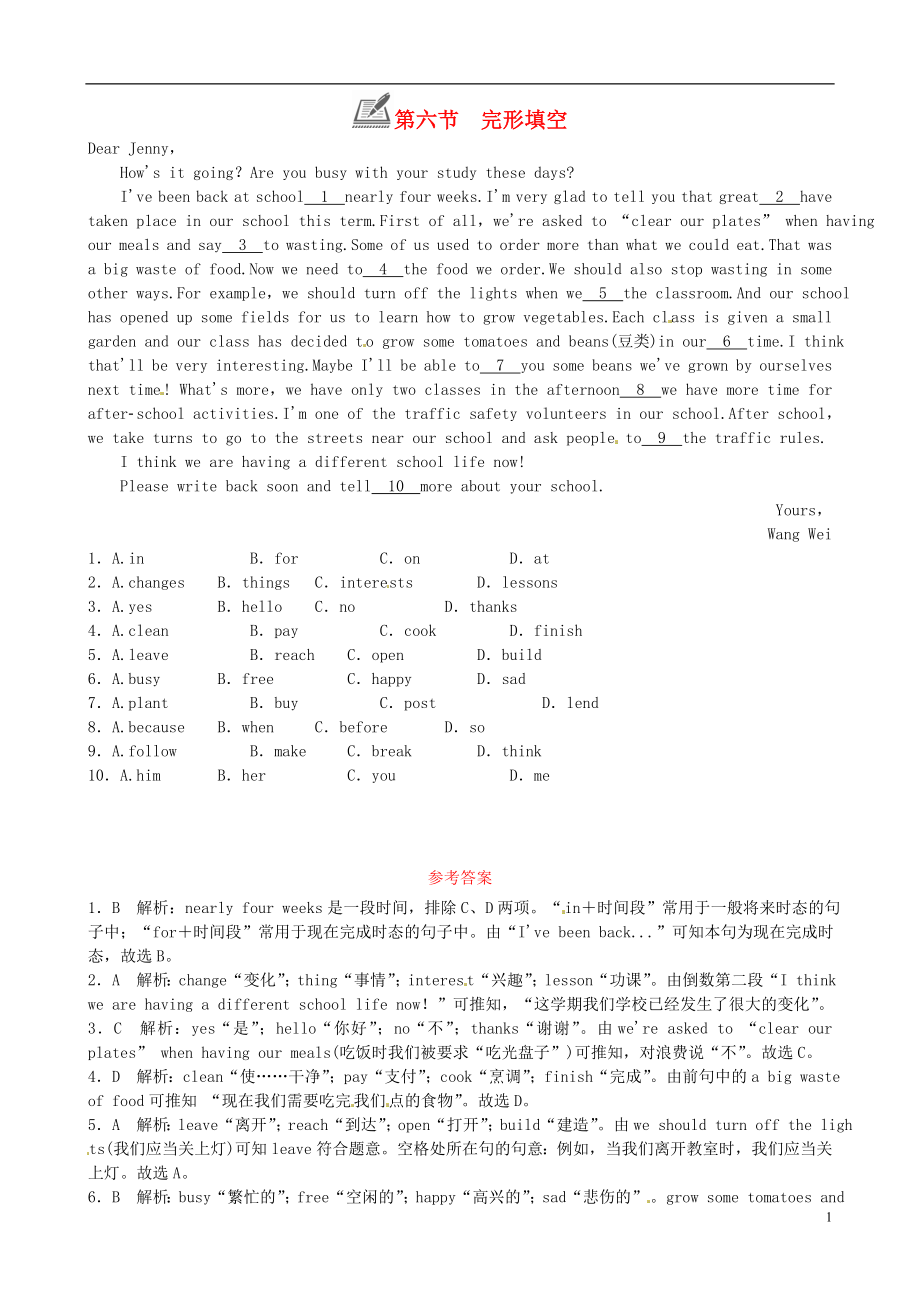《(山東棗莊)九年級(jí)英語(yǔ)全冊(cè) Unit 11 Sad movies make me cry第六節(jié) 完形填空同步訓(xùn)練 (新版)人教新目標(biāo)版》由會(huì)員分享��,可在線閱讀����,更多相關(guān)《(山東棗莊)九年級(jí)英語(yǔ)全冊(cè) Unit 11 Sad movies make me cry第六節(jié) 完形填空同步訓(xùn)練 (新版)人教新目標(biāo)版(2頁(yè)珍藏版)》請(qǐng)?jiān)谘b配圖網(wǎng)上搜索。
1����、
第六節(jié) 完形填空
Dear Jenny,
How's it going�?Are you busy with your study these days?
I've been back at school 1 nearly four weeks.I'm very glad to tell you that great 2 have taken place in our school this term.First of all,we're asked to “clear our plates” when having our meals and say 3 to wasti
2、ng.Some of us used to order more than what we could eat.That was a big waste of food.Now we need to 4 the food we order.We should also stop wasting in some other ways.For example��,we should turn off the lights when we 5 the classroom.And our school has opened up some fields for us to learn how to
3����、 grow vegetables.Each class is given a small garden and our class has decided to grow some tomatoes and beans(豆類(lèi))in our 6 time.I think that'll be very interesting.Maybe I'll be able to 7 you some beans we've grown by ourselves next time! What's more,we have only two classes in the afternoon 8
4��、we have more time for after-school activities.I'm one of the traffic safety volunteers in our school.After school�,we take turns to go to the streets near our school and ask people to 9 the traffic rules.
I think we are having a different school life now!
Please write back soon and tell 10 more
5、 about your school.
Yours��,
Wang Wei
1.A.in B.for C.on D.a(chǎn)t
2.A.changes B.things C.interests D.lessons
3.A.yes B.hello C.no D.thanks
4.A.clean B.pay C.cook D.finish
5.A.leave B.reach C.open D.build
6.A.busy B.free C.happy D.sad
7.A.plant
6�����、 B.buy C.post D.lend
8.A.because B.when C.before D.so
9.A.follow B.make C.break D.think
10.A.him B.her C.you D.me
參考答案
1.B 解析:nearly four weeks是一段時(shí)間�,排除C、D兩項(xiàng)��?!癷n+時(shí)間段”常用于一般將來(lái)時(shí)態(tài)的句子中;“for+時(shí)間段”常用于現(xiàn)在完成時(shí)態(tài)的句子中�����。由“I've been back...”可知本句為現(xiàn)在完成時(shí)態(tài),故選B����。
2.A 解析:change“變化”;t
7�����、hing“事情”�����;interest“興趣”�����;lesson“功課”���。由倒數(shù)第二段“I think we are having a different school life now!”可推知�,“這學(xué)期我們學(xué)校已經(jīng)發(fā)生了很大的變化”。
3.C 解析:yes“是”�����;hello“你好”;no“不”����;thanks“謝謝”。由we're asked to “clear our plates” when having our meals(吃飯時(shí)我們被要求“吃光盤(pán)子”)可推知�,對(duì)浪費(fèi)說(shuō)“不”。故選C��。
4.D 解析:clean“使……干凈”��;pay“支付”����;cook“烹調(diào)”;finish“完成”����。由前句中
8、的a big waste of food可推知 “現(xiàn)在我們需要吃完我們點(diǎn)的食物”����。故選D。
5.A 解析:leave“離開(kāi)”����;reach“到達(dá)”�;open“打開(kāi)”�����;build“建造”�����。由we should turn off the lights(我們應(yīng)當(dāng)關(guān)上燈)可知leave符合題意���?��?崭裉幩诰涞木湟猓豪纾?dāng)我們離開(kāi)教室時(shí)��,我們應(yīng)當(dāng)關(guān)上燈���。故選A。
6.B 解析:busy“繁忙的”�����;free“空閑的”���;happy“高興的”�����;sad“悲傷的”����。grow some tomatoes and beans(種植一些西紅柿和豆類(lèi))應(yīng)該是“在我們空閑的時(shí)間”,故B項(xiàng)符合題意��。
7.C 解析:pl
9�����、ant“種植”�����;buy“買(mǎi)”�����;post“郵寄”���;lend“借出”��。比較所給選項(xiàng)的意義及本文的寫(xiě)作格式是一封信���,再根據(jù)上下文可推測(cè)空格處所在的句子應(yīng)意為:下次也許我將能郵寄給你一些我們自己種植的豆類(lèi)����!故選C項(xiàng)���。
8.D 解析:because“因?yàn)椤?����;when“當(dāng)……時(shí)”���;before“在……以前”;so“因此”��?�?崭袂耙痪洹傲硗?,我們?cè)谙挛缰挥袃晒?jié)課”與空格后一句“我們有更多的課外活動(dòng)時(shí)間”之間是因果關(guān)系�����,前面是原因,后面是結(jié)果�。因此用so。故選D��。
9.A 解析:follow“遵守��;遵循”��;make“制作”���;break“打破”����;think“考慮”��。由空格所在句的前一句I'm one of the traffic safety volunteers in our school.(我是我們學(xué)校交通安全志愿者中的一員�����。)可推知�����,“放學(xué)后,我們輪流去我們學(xué)校附近的街上����,讓人們遵守交通規(guī)則”。故選A�。
10.D 解析:本文是王偉以第一人稱(chēng)的形式寫(xiě)給珍妮的一封信,故此處應(yīng)意為“請(qǐng)盡快給我回信���,向我講述更多有關(guān)你們學(xué)校的事情”�����。I的賓格是me�����。故選D��。
2
 (山東棗莊)九年級(jí)英語(yǔ)全冊(cè) Unit 11 Sad movies make me cry第六節(jié) 完形填空同步訓(xùn)練 (新版)人教新目標(biāo)版
(山東棗莊)九年級(jí)英語(yǔ)全冊(cè) Unit 11 Sad movies make me cry第六節(jié) 完形填空同步訓(xùn)練 (新版)人教新目標(biāo)版

